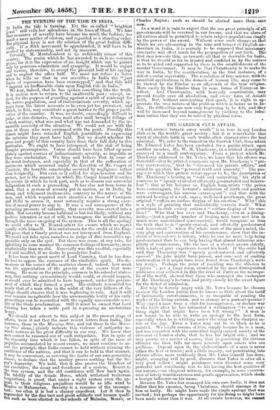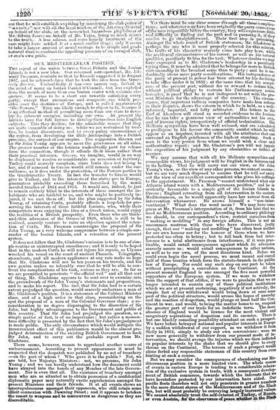THE GAERICK CLUB AFFAIR.
"A soft answer turneth away wrath" is as true in any London club as in the world's great societer ; but it is remarkable that want of absolute faith in Such truths often characterizes the best educated. We refer to the tumult in the Garrick Club, from which Mr. Edmund Yates has been excluded for a public attack upon another member; Mr.W..M. Thackerav, in a critical description conveyed to a small contemporary. from a protest which Mr. Thaekeray addressed to Mr. Yates, we learn that his offence was threefold—that he printed comments upon Mr. Thackeray's "pri- vate conversation,', that he " discussed his private affairs," and called in question his "personal truth and sincerity." The pas- sages to which this protest refers appear to be, the description of Mr. Thackeray's bearing as "cold and uninviting," his style of converse as "openly cynical or affectedly goodnatured and benevo- lent"; that at his lectures on English humourists "the prices were extravagant, the lecturer's adulation of birth and position were extravagant, his success extravagant"; and that with the outward bearing of a cool, suave, well-bred gentleman, the great original " suffers no surface display of his emotion." Why I this is a style of painting that undoubtedly corrects itself. What gentleman in club society suffers a " surface display of his emo- tion?" Who that has ever met Thaekeray, even at a dining- table,—(and a goodly number of leading men have met him in much more unrestrained conversation), would recognize as true the trait that he is "openly cynical, and affectedly goodnatured and benevolent "; when the whole turn of the man's mind, the very play and conversation of his countenance, show that the in- stinct of benevolence is inborn, while he can no more help being good-natured than he can help having that almost infantine sim- plicity of countenance, like the face of a cherub grown elderly, with a halo of gray experience round his head. If the critic had said that Thackeray was " openly good-natured and qffectedly cynical," the joke might have passed, and some sort of smiling confirmation of it might have been found from Thackeray's writ- ten works. Perhaps the point of rankling was the allusion to " prices " ; yet a large room, crowded by the most distinguished audiences ever collected in this the rival of Paris as the metropo- lis of the world, showed that those who managed the exchequer of Mr. Thackeray's lectures had pretty closely hit the exact figure for the ticket of admission.
But why be fiercely angry with Mr. Yates because he chooses to show the London public that he knows so little about the tariff of fashionable entertainments, is so incapable of reading the works of the living satirist, and so clumsy as a portrait-painter ? Why expel a man from a club for incompetency, or declare war to the knife after he has intimated a willingness " to set any- thing right that might have been left wrong ?" A man is not bound to be able to write au apology in the best form, especially when he is writhing under the sting of the sharpest sa- tire of the day. Even a Yates may not be so black as he is painted. We might assume of him, simply because he is a man, and has consorted with the somewhat highly-spiced society of the cleverest of London clubs, that he has his bright side ; and we may assume as a matter of course, that in punishing the obvious offender the blow falls far more severely upon others who are guiltless. Depend upon it, the club-estimate of a man is never either the best or truest; and a little inquiry, not penetrating into private affairs more recklessly than Mr. Yates himself has done, might, avenging evil by good, discover that Yates is after all a very good fellow ; might perchance even discover some very powerful and convincing test to his having the best qualities of our nature,—an eloquent witness, for example, iu some counten- ance of lovely considerateness and gentle appreciation, which sheds a benign influence on his name. Because Mr. Yates has managed his own case badly, it does not follow that his enemies, being Christians, should manage it for hint as badly. He might have made the ample apology that was invited; but perhaps the opportunity for his doing so might have been made wider than it was. At all events however, we cannot
seeldhatche wilhestab *ehtapythang bs-itinnvicting the club poitter of kuissanit.n7.-nor will ;all ithe kg el aresaciant , I the At tar ey -General ortcheimilef the cittb,!.4t1 th#71°113,TlYliat,r,lisszartiotis play fulifessi.f efralia.initi dames on‘reks4411Ties, bring us much nearer tathatetiisthl A: less, solemn and more wane treatment 01 the ear inightshave Settled„it at a much Saidkrst the ; ohly it seems t,ditakeiailwers amount or moral courage to be simple and good- nil:tarell thanto.eonfroot the appalling presence of au enraged club, or maser own pride. „
. .



























 Previous page
Previous page